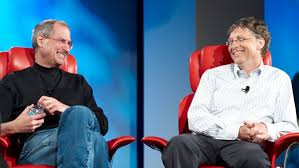Jobs stared at the floor. Later he told me that he was blown away by how honest and gracious Gates had just been.
乔布斯盯着地板。他后来对我说,盖茨的诚实和风度让他震动。
Jobs was equally honest, though not quite as gracious, when his turn came.
轮到乔布斯回答时,他也一样诚实,尽管并非像盖茨那样有风度。
He described the great divide between the Apple theology of building end-to-end integrated products and Microsoft's openness to licensing its software to competing hardware makers.
他描述了苹果和微软的理念鸿沟,苹果欲打造端到端一体化的产品,微软则将自己的软件开放授权给彼此竞争的硬件厂商。
In the music market, the integrated approach, as manifested in his iTunes-iPod package, was proving to be the better, he noted,
他指出,在音乐市场,集成的做法更好,这个已经有iTunes/iPod组合可以证明,
but Microsoft's decoupled approach was faring better in the personal computer market.
但是在个人电脑市场,微软的分离政策发展得更好。

One question he raised in an offhand way was: Which approach might work better for mobile phones?
这番话随即引出了一个潜在的问题:在手机市场,哪种方法会更好?
Then he went on to make an insightful point:
接着,他提出了一个精辟的观点。
This difference in design philosophy, he said, led him and Apple to be less good at collaborating with other companies.
在设计理念上的差异导致他及苹果公司更不善于同其他公司合作。
"Because Woz and I started the company based on doing the whole banana, we weren't so good at partnering with people," he said.
“因为沃兹和我创办公司的时候,所有东西都是D己在做,因此我们不是很善于与人合作,”他说道。
"And I think if Apple could have had a little more of that in its DNA, it would have served it extremely well."
“我认为,如果苹果天生能够多一点点合作精神,会非常好。”


